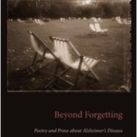Alzheimer’s Disease impacts both its victims and the people who care for them.
Poet Holly Hughes knows this all too well, having cared for her mother as she went through the stages of Alzheimer’s disease.
As a poet, it was only natural for her to find solace in works of poetry. After her mother’s passing in 2001, Hughes decided to preserve her memory in a collection of poems about Alzheimer’s in the hopes that it would help those whose lives had been touched by the disease as well.
“I put out a call for submissions and received over 500 in only a few months time…so clearly there was a lot of beautiful work out there that needed a home.”
This collection, entitled Beyond Forgetting, provides an intimate look into the memories of the writers who witnessed this disease, and captures the vast spectrum of emotions that they felt – from fear and bewilderment to happiness and humor.
Hughes also made the conscious decision to include short blurbs about the writers’ personal stories at the end of their poems. The added context for the poems helps reinforce the fact that these are real experiences, and adds another layer to the emotions so beautifully expressed in the poems.
The order of the poems themselves purposely reflects the progression of the disease, with each section representing its different stages. By doing this, Hughes transforms the book into a companion for the reader, and brings to the light the humanity and grace present in each of the writers’ memories.
“In entering the imaginative, metaphoric, or narrative expression of another, even if it is the expression of pain, longing or fear, you find yourself less lonely, accompanied in this life.”
As for the meaning behind the title, Hughes says it is twofold.
“It [the title] suggests that those we lose to Alzheimer’s are beyond forgetting, as well as that there is more to this disease than forgetting.”
Tess Gallagher, the poet who wrote the foreword for Beyond Forgetting, puts it best when she says, “We may mistakenly think forgetting eclipses other human abilities when it most surely does not.” Both she and Hughes stress the importance of staying in the present with your loved one, and that even though the person we knew is slipping away, there is still the person in the present moment with whom we can be and appreciate.
When asked why she turned to poetry as a way to make sense of the disease, Hughes turns to the words of Jane Hirschfield, a fellow poet, to explain:
“In entering the imaginative, metaphoric, or narrative expression of another, even if it is the expression of pain, longing or fear, you find yourself less lonely, accompanied in this life.”



